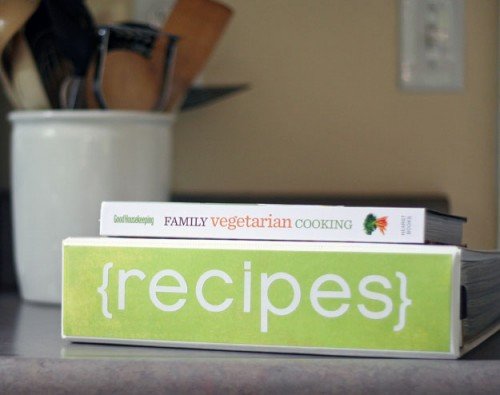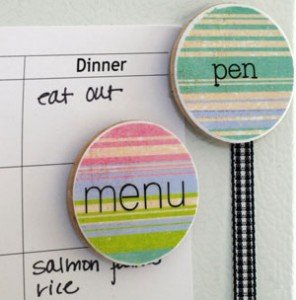Is getting dinner on the table an unpleasant or even stress-filled event at your house? If so, you’re not alone. In fact, meal planning is one of the hottest topics in the private forum of our It’s About Time class.
So why is this? Well, whether you love to cook or hate to cook, eating is one of life’s basic necessities. Figuring out how to get food into your stomach and the stomachs of your family simply has to get done—three times a day—so it makes sense to simplify it as much as possible. And that’s where meal planning comes in. Meal planning takes the guess work (and stress) out of getting meals on the table.
Meal planning has many other benefits, too. For example, when you know what you’re going to cook for meals, you can shop intentionally. This saves time at the store and time racking your brain to see if there really is a way to turn the five ingredients left in your refrigerator into a tasty meal. Meal planning also helps you eat healthier and save money. You’ll find yourself making fewer last minute trips to the grocery store for that one missing ingredient you need for tonight’s dinner, and you’ll be less likely to order carry out or go through the drive through. And if all of this wasn’t enough…planning your meals in advance also allows you to waste less food which is good for your wallet, not to mention the planet. In short, meal planning can save you time, money and give you tremendous peace of mind.

Now if you don’t currently meal plan and you don’t much like the thought of giving too much structure to that part of your life, keep this in mind. It doesn’t have to be all or nothing. You can decide how much planning will work for you, how rigid you want to be with your plans, and how much flexibility you want to fit in. If you currently wing it and its working great for you—keep on winging it. But, if your current plan (or lack there of) is causing you to waste time, waste money or create unnecessary stress, give some of the tips below a try. Think of these tips like they’re ala carte menu items—choose the ones that will help you build a meal planning system that works for you.
- Make it simple. If it’s simple you’re much more likely to do it. So, make it super easy to plan your meals by corralling together your favorite, tried and true recipes into a recipe binder, or into a directory on your computer. Then, use a simple form that allows you to capture your meal plan and shopping list.
 Start small. If you don’t currently meal plan, start by planning just a meal or two each week so you can see what works for you and what doesn’t. Then adjust accordingly. My current system involves planning six or seven dinners each week, with a weekly grocery shopping trip. I have tried planning and shopping for two weeks worth of groceries, but this didn’t work for me. I know people who plan for (and shop for) a month of meals. (Just the thought of that causes me a near panic attack.) So, give yourself permission to start small and stop at the point when you’ve created a system that works for you.
Start small. If you don’t currently meal plan, start by planning just a meal or two each week so you can see what works for you and what doesn’t. Then adjust accordingly. My current system involves planning six or seven dinners each week, with a weekly grocery shopping trip. I have tried planning and shopping for two weeks worth of groceries, but this didn’t work for me. I know people who plan for (and shop for) a month of meals. (Just the thought of that causes me a near panic attack.) So, give yourself permission to start small and stop at the point when you’ve created a system that works for you.- Remain flexible. Just because it’s a plan doesn’t mean it has to be set in stone. For example, I assign meals to specific days of the week, but then we go with the flow. If make-your-own pizzas were slotted for Friday, but everyone is craving pizza on Tuesday, we have pizza on Tuesday. So we have a plan, but we keep it flexible.
- Keep doing what works. When you find a meal (or even a week’s worth of meals) that you and your family loved—use it again. Don’t feel as if you have to reinvent the wheel week after week. Instead, build a repertoire of meals and / or meal plans that works for your family, and reuse them. Tuck them away in your recipe binder so you have a plan to follow on weeks when you’re short on time or not feeling very inspired to experiment with new recipes.
- Select meals based on your plans. My meal planning sheet has a place to list activities we have scheduled each day of the week. This allows me to think through our nightly schedule and select meals based on how much time we’ll have for dinner prep and clean up. On nights when we’re running from guitar lessons to Tae Kwon Do with just a quick break in between, dinner must be simple. This is a great night for a crock pot dish that can be prepared in the morning when there’s more time in our schedule, or for a made-ahead freezer meal. I like to experiment with new dishes or make things that take a bit more time on weekends or when our schedule has a bit more breathing room.
- Select meals based on what you already have on hand. Another great meal selection criterion is to focus on using up the ingredients you already have on hand. Before menu planning, scan your refrigerator, freezer and pantry and jot down a list of ingredients you want (or need!) to use up before they go bad. Then, scan your recipe binder or cookbooks for dishes built around these ingredients.
- Select meals based on what’s on sale. If you like to shop the sales, use your grocery store’s weekly ad to help you decide which dishes to include on your weekly meal plan.
- Select meals based on what’s in-season. Our weekend routine in the summer usually includes a Saturday trip to our town’s Farmers Market. We peruse the stands and select locally grown, in-season produce that looks particularly tasty. Then, we go home and plan our meals around our weekly produce selections.
- Write down your shopping list and sort it in aisle order. Once you’ve decide which meals you’ll eat, record the necessary ingredients on your shopping list. Group items together in aisle order to save time at the grocery store.
- Work menu planning into your schedule or routine. Our current process is to plan our meals on Sunday mornings at breakfast. It’s a time when we’re all together, which allows us to get everyone’s input on which dishes sound good. Carve out a time to plan your meals each week, and then, as with everything else in this process, give yourself permission to tweak and adjust as you learn what works for you.

Here’s my problem: I plan several meals, buy my groceries, and my ingredients disappear before I can use them. How can I keep my son from raiding the refrigerator??????????
What about keeping the groceries that are specifically for meals segregated and in a separate bin or basket in the fridge and pantry so he’ll know which items are off limits for casual eating. 🙂
Aby
This is so funny! My husband used to devour everything in the fridge – so his mom labeled things with “don’t eat” labels! He took pictures of the fridge one time – and I have it scrapbooked –
“Hands off! Grant, this means you! Don’t eat!”
One of my boys is grown and moved out, so maybe take a picture?
🙂
Jennifer
thank you this was very helpful